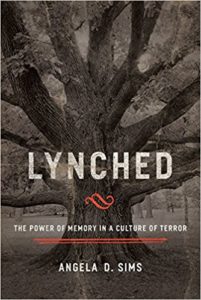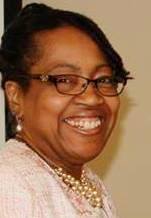Reflection on Lynched: The Power of Memory in a Culture of Terror by Dr. Angela D. Sims, by Margaretta Narcisse
 I was struck by the size, textures, and limbs of the monochromatic picture of the tree on the cover. A tree which was forced to bear “strange fruit” it was never meant to bear.
I was struck by the size, textures, and limbs of the monochromatic picture of the tree on the cover. A tree which was forced to bear “strange fruit” it was never meant to bear.
Reading Lynched forced me to think about the ways in which I, an African American woman in the United States, bear the strange fruit of racism, sexism, classism and other social ills, that I was never meant to bear. As a woman of faith, I was challenged to think about the ways through which my faith is formed in the face of the neo-lynching culture of terror surrounding African American lives.
As Angela Sims writes in her excellent book Lynched,
“Daily, we must ask ourselves not what is the gospel of Jesus the Christ but how does this incarnational narrative inform the manner in which we seek to remember that which epitomizes evil as we simultaneously strive to embody that which is just.”[1]
Indeed, how do we remember the most disturbing acts of white-on-black terror and keep the faith? The oral history of the Elders, as painful as they are, led beyond the merely-informative and helped me gain an understanding of the strategies they engaged to “navigate spaces that were subject to detonate without warning”[2] through a horrific period of terrorism. Their courage, wisdom, and skill to strategically navigate, affirm the call for resistance and inspire hope for navigating the current expressions of lynching black lives endure. As Sims records, this call to active resistance and hope is not given lightheartedly. IED’s are all around. Sims writes:
Far from passive submission, when the church embraces a call to remove the veil of ignorance around matters of intersecting realities of race, gender, identity, and other artificial configurations, it takes an active stance against sin that is couched in white-supremacy ideology. In a context where all lives are not valued equally, when the church elects to confront systemic evil, it does so with a persistent resolve to be a bearer of a truth that demands that it identify and name correctly “the cosmic powers of this present darkness.“[3]
Lynched: The Power of Memory in a Culture of Terror is not easy to read. The parallels between the horribleness of racist terror then and now are disturbing. But the power of the memories that comes through reading these oral histories inspires me to remain a bearer of truth.
The many trees forced to bear “strange fruit” they were never meant to bear, were able to bear the burdening fruit because of their deep roots in the life-giving earth. The power of oral histories of the elders bear witness to deep roots that are in life-giving faith. That deep-rooted faith is vital for me and everyone to seek life beyond what is forced onto them tenaciously.
[1] Angela Sims, Lynched: The Power of Memory in a Culture of Terror (Waco: Baylor University Press, 2016), 16.
[2] Sims, xv.
[3] Ibid., 119.
The Rev. Margaretta Smith Narcisse is an Itinerant Elder in the African Methodist Episcopal Church. She is a certified spiritual director, Prepare/Enrich facilitator, chaplain at Truman Medical Center, and the Associate Dean of Students at Saint Paul School of Theology in Kansas. She has a Bachelor of Science in Psychology and a Master of Divinity from Saint Paul School of Theology.
Margaretta and her spouse are the parents of two wonderful adult sons. She enjoys communing with nature, spending time with family and friends, listening to music and completing races.

